
And They Didn’t Even Buy Us Dinner First: Property Insurance Woes
Property insurance is necessary if you own a car or a home, especially if you have a loan or mortgage. But it’s also a flawed system that punishes you for using the coverage you’ve paid for.
Surviving without health insurance is difficult, too, and I don’t even want to get into what’s wrong with the state of healthcare in the United States.
Finding insurance coverage
Shopping for insurance coverage is easy if you’ve never had a claim and just want to save some money. You can go online to compare rates of major and not-so-major companies and choose the one with the best price and coverage. Often, there’s a discount for having car and home policies with the same company.
Some of the majors include All State, Farm Bureau, Nationwide, Progressive, and State Farm, to name a few. When I went shopping for my first grown-up car policy, I went with Farm Bureau because that’s where my parents had a policy. Then, when Jonathan and I got married, he moved his vehicle to Farm Bureau with our combined policy.
In 2008, we bought our first home and had our first child. Farm Bureau was there for us again with life insurance and our brand-new homeowner’s policy.
After the birth of our second child in 2012, we purchased a larger home, fixed it up, and moved in in early 2013. Of course, Farm Bureau wrote our new policy. They required that we put a new roof on the house within 6 months, but we knew that going in and had figured in that cost when purchasing the fixer-upper.
Filing claims
The first homeowner’s claim we filed with Farm Bureau was for storm/wind damage in 2014-ish. We had damage to our synthetic stucco and elected to take the payout, which we applied toward the new vinyl siding we financed. The claim process was easy, and the inspection of the work went fine.
The next time we called with a question was in 2020, when we discovered a minor roof leak. Farm Bureau sent out an inspector, who determined the leak was not caused by storm damage. We had a roofer (the same one who roofed our house in 2013) repair the damage, which was basically a fluke thing because of the way the siding met the roof. I remember the repair being around $700, so we just paid it and moved on. Because there was no “claim” in our minds, we didn’t think of it again.
The water claim

Claim 3 came in June 2022. The water valve behind our refrigerator burst and flooded the kitchen and adjacent laundry room. It ruined the walls and floors throughout the area, but fortunately, it did not damage our brand-new kitchen cabinets, which we’d been waiting 10 years to afford.
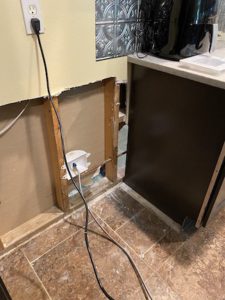
The process went smoothly, and we were able to get our home repaired with new floors since our old floor pattern had been discontinued. Otherwise, we would have just replaced what tiles were damaged. We paid our deductible and worked with a company that fixed everything. I paid the company extra to run the flooring into the bathroom that connects to our laundry room since we had enough of the flooring left over.
The fire claim
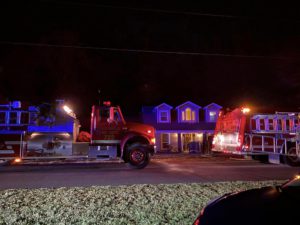
In October 2022, bad luck hit us again. It had been a stressful week, so I took a bath in our newly renovated master bathroom (the other part of our reno project we’d waited 10 years to afford). The fall air had a chill to it, so I turned on our bathroom heater, which was one of those combo units with a light and exhaust fan.
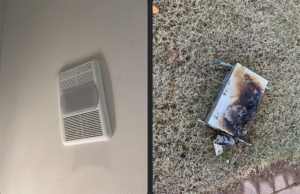
Like always, there was a stench from the heater of the dust burning off the coils, so I thought nothing of it. Two hours later, at 11 p.m., the intense burning scent had filled our bedroom. There was no smoke. Jonathan grabbed the kitchen stepstool and climbed to investigate.
As soon as Jonathan put his hand on the ceiling to brace himself, he jumped back because the ceiling was incredibly hot. At that point, he told me to call for help because he thought our attic was on fire. I made the call while getting our daughter, and Jonathan ran upstairs to get our son. We then went out on the deck to see if we could see any smoke, but we couldn’t.
Next, we put the kids and our two dogs into one of our cars and drove across the road. I stayed in the car while Jonathan went back and moved our other car.
The Dardanelle Fire and Police Departments were on the scene within 8 minutes and saved our home. They told us after the fact that the attic was smoldering and ignited as soon as they opened up the ceiling. They were immediately able to extinguish the flames. Had we opened the ceiling on our own before they got there, we would have lost our home.
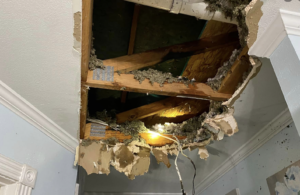
The next day, we called our insurance agent and started the recovery process. There was minor fire damage and major water damage in the bathroom, master bedroom, living room, and entryway from putting out the fire (plus the overspray from the hose seams).
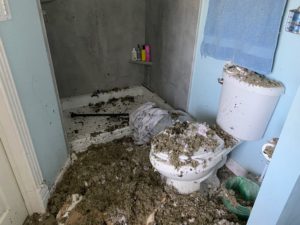
The adjuster was great and approved our claim quickly. The day after the fire, a restoration company was there to start the drying process with fans and dehumidifiers. They were great. They were able to clear the singed smell and prevent any mold. There was no major smoke scent in the house because smoke never filled our home or even made the smoke alarms go off.
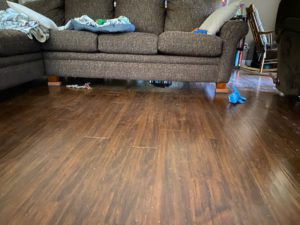
Long story short, we had to replace flooring, personal belongings, and food in the fridge that died during the 24 hours without power. The drywall in the bathroom needed to be repaired, and we had to repaint the walls in the bathroom and the ceilings in the bathroom, living room and master bedroom.
Everything was approved, and we got a check to cover the repairs that we turned over to our mortgage holder. Due to the holidays, Jonathan and I had to serve as our own general contractors and piece out the repairs since no one company could take care of everything in a timely manner.
Basically, we needed the giant, non-insulated hole in our bathroom ceiling repaired before winter. We could have lived without floors for a while, but the hole had to be fixed. The company that fixed the hole didn’t have time to paint, and the people who installed the flooring didn’t have time to demo the old flooring (what portions hadn’t already been removed by the restoration company during the drying process).
Hiring out different companies cost more than the insurance estimates, so Jonathan and I rented a dumpster and did the demo work ourselves to save time and money. We bought supplies so I could handle priming and painting the water-stained ceilings and walls.
The mortgage holder held the funds in a trust, and I used a credit card to cover all the repairs or asked for checks to be issued directly to the subcontractors. Everything got repaired, and we used all of the funds, plus some money in savings (to cover the deductible portion).
There was no inspection of the repairs, even though we alerted Farm Bureau when everything had been completed.
Getting a non-renewal letter
We thought everything was fine after our misfortune. By January 2023, our claim was closed, and we’d replaced the damaged items and submitted receipts. For example, I’d lost several books from a bookshelf in my entryway due to water damage. I had been able to save some by drying them out and replaced some of the older books with used books from eBay. I didn’t just purchase all new books to replace books that I’d had for years.

We filed no claims in 2023 and remained grateful our home had been saved and that all the repairs were finished. Then, in late January 2024, we received a letter in the mail from Farm Bureau.
On March 22, 2024, our current homeowner’s policy would expire, and they would not be renewing it. WTF?
After meeting with our insurance agent, Rick Adkins, at the Farm Bureau branch in Russellville, Arkansas, we were told it was due to having had three claims in three years.
At that point, we didn’t even remember the storm damage question from 2020 because we had no idea it was considered a claim since there was no payment.
Rick said he was sorry, but he didn’t have a leg to stand on. I asked, “What’s the point of having insurance if you get punished for having to use it?” He said some stuff about the industry and rising costs, but I stopped listening because I was in disbelief that we were in this situation. He gave the name of a private broker after giving us a horror story of some people having to pay $10,000 a year for insurance with a high-risk company after fire claims. Thanks, Rick.
We were also told that insurance-wise, we’d have been better off had our house been a total loss since a new-build would be easier to cover. Again, WTF?
No appeals process
There was no appeal process available to try to stick with the insurance company we’d trusted for 20 years. Now we would have to take our car insurance elsewhere, too, and we had life insurance we couldn’t move. (Getting term-life as a 20-something costs a lot less than starting a new policy at 40-something).
It didn’t matter that we’d filed no claims in 2023.
It didn’t matter that we’d hired an electrician after the fire—at our own expense—to remove the exhaust fans from the other three bathrooms in our home (two of which were the same type as the one that had shorted out) and replace them with newer, safer units without heat.
It didn’t matter that we’d added smoke detectors to every bedroom and main living areas (code dictated one per level outside each sleeping area at the time our house was built in the late 1990s) to bring things up to current code. These new smoke detectors integrate with our monitored alarm system.
It didn’t matter that we’d had our electric system inspected and ensured that every light fixture, electrical outlet, and light switch was safe to (hopefully) prevent future fires.
Proof of investment in the home
And it didn’t matter all the improvements we’d made to the house since purchasing it, which should prove how invested we are in this place—how much we love it.

When we first bought the place, we had to fix it up to make it livable. We had a bridge loan to cover two mortgages until we could sell our first home and move into this one. Plus, we both worked full-time and had two small children—a baby and a 4-year-old. We could only work on the house nights and weekends. After dinner, Jonathan would drive to the house and work for a couple of hours. He would come home, and then I would go work on the house for a couple of hours. On the weekends, we’d split time or work together when our wonderful parents or siblings could help us with the kids.

We painted and replaced flooring and countless other projects on our own because we couldn’t afford to hire out everything. Here are some of the improvements (besides the electrical work mentioned above):
- New roof
- New vinyl siding
- Landscaping and drainage improvements
- Solar panels
- Removed four dying trees
- Installed chain-link fencing
- Had a new deck built
- Replaced all windows and exterior doors
- Replaced almost all flooring
- Painted almost every wall and ceiling
- Updated 2 bathrooms, repaired one, and completely renovated one (all toilets and plumbing fixtures replaced)
- New sewer line
- Renovated kitchen
Shopping around as an “uninsurable” homeowner
The recommended broker at Brown & Brown didn’t even let us get seated at her desk before telling us that she couldn’t “shop us” with a fire claim. She sent us to Pledger Insurance Agency in Russellville.
The lady there, Cheryl King, is fabulous. She told us that it would be difficult, but she’d do everything in her power to help us.
At the same time, we were talking to our credit union and mortgage holder, Arkansas Federal Credit Union (AFCU). I told them about the situation in case we needed to be put on force-placed insurance as a last resort.
What is force-placed insurance?
Force-placed insurance is when the lender covers a property on their own policy to protect their interest. The property owner still pays the premium, which is generally at a high cost, but the policy only covers the amount owed on the loan. In our case, we owe less than half the value of our home. We only have about 11 years left to pay on our mortgage since we refinanced in 2020, moving to a 15-year mortgage to shave about 7 years and thousands of dollars of interest off our loan.
Actual Cash Value Policy
Another option for an “uninsurable” client is an ACV or Actual Cash Value Policy. Basically, if we have to file a claim on our roof, we’ll get paid out the value of an 11-year-old roof and have to come up with the difference to replace it. Traditional policies would cover the cost of a new roof minus the deductible (usually $1,000).
Getting screwed by the prices and deductibles
Another fun fact about ACV policies is that the deductibles are typically higher, as much as $5,000 for a roof claim and $2,500 for other peril. Cheryl at Pledger found us an ACV policy that a company called Southern Pioneer said they’d write. She warned us that this policy wasn’t the best and said we should go with a replacement value policy if AFCU could find us one.
Originally, we thought we’d found a traditional policy through the insurance division of AFCU. We’d gotten a quote that was about $500 more than what our renewal would have been with Farm Bureau. (On a side note, our policy premiums had already doubled during the last three years and were at $2,400 per year for a $350,000 home value with a $1,000 deductible.)
We were thrilled that the financial burden wouldn’t be what we thought. Because of Rick’s horror story of $10,000 insurance premiums, we were especially grateful to only have to come up with an extra $500.
In anticipation of the new homeowner’s policy, we moved to Progressive for car insurance through the AFCU insurance division so we could get a discount on both policies. We paid the premium, which was about $200 more per 6-month term. The kicker was that we had to pay the premium upfront, so I had to put that on a credit card.
The underwriting nightmare
Unfortunately, we got hung up in underwriting when AFCU tried to finalize our homeowner’s policy. Despite being initially approved and quoted, underwriting denied us because we had a claim still open from 2020. Again, WTF? We confirmed with Farm Bureau that the non-paid “claim” was, in fact, closed as of 2020, but none of that mattered. Underwriting with the potential new company had said no, and there were no appeals.
AFCU apologized profusely, and we hold no ill will toward them. It’s not their fault. They did their due diligence and thought everything had been approved. They offered to let us move our Progressive car insurance policy to a new agent with no fees so we’d still qualify for a bundle discount if the private broker could find us something.
Backtracking
We went back to Cheryl and asked for help again. Based on her advice, we asked for the fire report from the Dardanelle Fire Department to prove that the fire had not been our fault. We never had a copy because it was up to Farm Bureau to investigate the cause of the fire, and we’d never received any of that documentation. We’d just assumed everything was fine—they wouldn’t have paid the claim had they thought we were arsonists, right?
The ACV policy with Southern Pioneer was approved, and our Progressive Auto Policy was moved to Pledger Insurance Agency. Overall, we’ll end up paying about $800 more this year for the cost increases for the home and car policies. Still not great, but better than Rick’s horror story. Thanks, Rick.
Recovering from the stress and financial woes
The situation was extremely stressful. There were multiple tense conversations and unhelpful advice sessions. Life happened in the meantime with more bad luck to the tune of our 13-year-old washer and dryer set crapping out on consecutive weekends. Then, I had a flat tire due to a nail the weekend after that and had to get my car towed to a repair shop, where I discovered that all my tires were worn unevenly because of crappy alignment from my previous tire shop.
I can’t blame Farm Bureau for all our bad luck in 2022 or even for starting the downward spiral in 2024, but I am angry that they dropped us after 20 years. I’m angry that we’re paying more money for comparable car insurance coverage with another company and more money for less coverage for our homeowner’s policy.
Things are expensive enough as it is, even when you’re trying to be frugal.
The moral of the story
Insurance is a business. The bottom line is they want to make money. They want to pay out less money in claims than they bring in with premiums. I can understand raising premiums for someone who has frequent claims, especially with car insurance with unsafe drivers—those who constantly get into accidents for which they are at fault.
![]()
Their little slogans are all just BS. “Your Friends for Life” doesn’t mean anything if they’ll drop you for unrelated claims out of your control. My husband and I didn’t appreciate being treated like criminals. Hell, if we’re arsonists, we’re really bad at it! Our house was saved, and we’re grateful.
We love our home. We’ve worked our asses off for this home. This house is still our labor of love, and we want to protect it. Doesn’t everyone want to protect their home and livelihood?
So, thanks for helping us fix our house before screwing us over with a generic non-renewal form letter, Farm Bureau.
They could have at least bought us dinner first. Or a warning phone call from our friendly agent would have been nicer.
Do you have a bad insurance story?
Check out my husband’s take on the situation.
Let me know in the comments. I’d love to hear from you!
Thank you for reading,
-Brandi Easterling Collins
Image by gstudioimagen1 on Freepik




